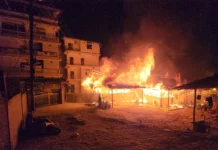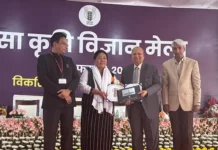[ Bagiso Hakung ]
We are aware that opium cultivation is a major problem in the Lohit, Anjaw and the TCL region of Arunachal Pradesh. For decades, the government and educated sections of society have been trying to address the issue. The Narcotics Department, along with the district administration of the respective districts, carries out operations annually – poppy plants are destroyed before or during the harvesting period.
Specifically in Lohit Anjaw, most of the cultivators regard it as part of their tradition, and for many, it is a major source of livelihood. They use the income for their children’s education, survival, and other expenses such as medical treatment, etc. They also keep it as a form of precautionary savings.
Most parents are associated with opium cultivation directly or indirectly; some do not cultivate but instead engage in the trade of finished products.
A recent wave of awareness has been carried out by responsible CBOs. They have been moving across the Lohit valley to spread awareness and warn about stern action against illicit cultivation. The discussions are primarily based on the harmful side-effects of opium, making it clear that it would be wrong to appreciate something that is killing you from within.
However, it is also important to understand the feelings of farmer groups. They believe that providing alternative means of livelihood would help resolve the issue, since they assume that economic weakness is the major reason. Alternatives such as government jobs, agricultural and horticultural schemes, and subsidized loans could be provided to opium cultivators. This sounds convincing, but will it really work in practice?
On the other hand, the government is constantly trying to end the opium menace through different approaches, including the enforcement of laws by force. CBOs are desperate to eradicate opium from their areas. Things are really complicated – we cannot disagree with the government and CBOs, nor can we ignore the farmers. Farmers are fragile, uneducated, and unskilled, so condemning them does not make sense in any way.
The real question is: what is the actual issue? Is it the lack of government attention to farmers’ pleas? Have CBOs failed to become good negotiators for the wellbeing of farmers? What’s really stopping our society from becoming an opium-free society?
Interestingly, if we dive a little deeper, we’ll realize that there are several deep-rooted issues preventing good from winning over evil. Let’s look at some of them:
- Systemic gaps in policy implementation: While the government introduces several livelihood schemes that could work as alternative schemes for opium,systemic inefficiencies often prevent genuine farmers from benefitting. At the district, block, and village levels, resources sometimes get diverted towards politically connected individuals, leaving marginal farmers overlooked. This misallocation discourages trust in alternatives and compels farmers to continue relying on opium as a survival strategy.
- Unskilled and unmotivated farmers: Even if farmers receive subsidized schemes of agricultural or horticultural products, they cannot make proper use of them due to lack of knowledge, absence of technology, and unawareness of modern methods. This prevents them from becoming productive farmers. Moreover, most farmers are less motivated or prepared to survive on products that give slow returns.
- Lack of educated and skilled population: While literacy has improved among the youths, true education remains elusive. Many can read, but struggle to write or communicate effectively. This gap between literacy and education limits their ability to grasp the deeper social and economic drawbacks of opium cultivation. In the absence of practical skills- such as masonry, carpentry, electrical work, mechanics, or craftsmanship – many young people feel constrained in their livelihood options, often viewing opium as the last resort.
- Lack of sustained efforts from government and CBOs: Opium cultivation has been a pressing challenge for nearly half a century, yet comprehensive institutional responses remain limited. There has been little systematic research to explore whether viable alternatives could work, or to devise strategies tailored to the region’s realities. Equally, community-based organizations (CBOs) have yet to initiate thorough, evidence-driven interventions. Without dedicated committees, research, and collaboration, the crux of the issue remains insufficiently addressed
The way forward
The opium crisis cannot be solved by quick fixes. It requires long-term social investment rooted in empathy, education, and community empowerment.
- Transforming farmers into agro-preneurs: By emphasizing proper training and market linkages, cultivators can shift from subsistence to commercial agriculture. Some portion of society’s wealth could be diverted into making such progress, rather than organizing hundreds of social awareness programmes throughout the year. The administration’s destructive approach has been going on for decades but has yielded nothing. They cannot completely erase cultivation, nor have they ever done so – destroying a few fields only raises the profit margin because it inflates the opium price. Dealing with such issues may therefore require long-term vision and policies.
- Skill-building initiatives: Community-based organizations should sponsor youth for ITIs and vocational courses, monitoring them until they secure employment in corporate or industrial sectors. This will encourage other youths to explore new avenues in life and also end the stereotype – the fear and shame of low-paid professions.
- Strengthening education: Education is the only weapon that can end this crisis in the long run. If neglected today, tomorrow’s children may become potential opium cultivators. The education scenario in Lohit and Anjaw is in critical condition and it needs critical care from both society and administration. Children should be groomed properly right from the primary level to higher secondary level, and the society should make sure that it happens. Otherwise the cycle will repeat again. The only way to break the loop is education.
Eventually, opium is perhaps the most genuine and pressing issue our society has faced for years. The complexity of the issue is not just confined to differing opinions of individuals – it is much more than that. This issue requires vast research, empathy, education, and awareness. A society must think beyond the concept of ‘Destruction, good or evil and alternatives’. The rest I’ll leave to the opinions of the readers. (The contributor is pursuing MA in economics at Rajiv Gandhi University, Rono Hills)




